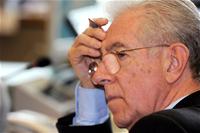Freedom, Sancho ... and the knights of the Swedish table
Ralitsa Kovacheva, July 15, 2010
 According to a popular eastern philosophy, one repeats the same mistakes (within one or a few lives) until he understands where he was wrong and until he makes the right choice. This fully applies to human history, not to mention that in the Buddhist sense, Bulgaria obviously has a bad karma.
According to a popular eastern philosophy, one repeats the same mistakes (within one or a few lives) until he understands where he was wrong and until he makes the right choice. This fully applies to human history, not to mention that in the Buddhist sense, Bulgaria obviously has a bad karma.
Accidentally or not, I read two textsat the same time. One was the report of former European Commissioner Mario Monti on relaunching the Single Market in the EU, written under the special request of Commission President José Manuel Barroso. And again, but for the first time with understanding, I read the memories of Margaret Thatcher on her years at Downing Street 10 as Prime Minister. Only subsequently I discovered that the Monti report starts with a quote from Margaret Thatcher, apparently because the historical analogies are self-imposed.
The parallel between the two texts, written with nearly 20 years distance in time, is amazing because both raise the question of fundamental choice. Former Commissioner and Professor Monti has fully convinced me that this choice is being faced not only by Bulgaria (or at least not at the most, as I was inclined to think) and Margaret Thatcher - that this is not the first time this choice is being made. Why is it necessary to make the same choice again? Apparently, because somewhere down the road we have diverted from the goal, absorbed by self indulgence, and we have forgotten where we were going to and - most of all - why.
I will start with Margaret Thatcher, firstly because of chronology and  secondly because the situation which she describes in Great Britain in the 70s painfully reminded me that in Bulgaria today. Thatcher describes British Socialism of nationalized enterprises, the strong (and corrupt) trade unions, swiftly rising government costs, aimed at maintaining the illusion of a prosperous country. "The social benefits, distributed with little or no account of the efforts, have promoted the lawlessness, have facilitated disintegration of family and have replaced the conscious useful labour and self-reliance with vicious incitement to idleness and swindling."* These words are still strong and valid for the policy of both the communist and the contemporary Bulgarian governments.
secondly because the situation which she describes in Great Britain in the 70s painfully reminded me that in Bulgaria today. Thatcher describes British Socialism of nationalized enterprises, the strong (and corrupt) trade unions, swiftly rising government costs, aimed at maintaining the illusion of a prosperous country. "The social benefits, distributed with little or no account of the efforts, have promoted the lawlessness, have facilitated disintegration of family and have replaced the conscious useful labour and self-reliance with vicious incitement to idleness and swindling."* These words are still strong and valid for the policy of both the communist and the contemporary Bulgarian governments.
Thatcher’s major goal, when coming to power, is to convince the public again (even her fellow Tories!) of the benefits of the free market, in the need of people being stimulated to take the initiative for their own lives and the state to limit itself in establishing rules and order. It turned out that this creed in which I also firmly believe, is not shared by wide circles in Bulgaria (not surprisingly) and also in Europe. I was inclined to think that in Bulgaria the bad attitude towards the "market" is stronger than anywhere in the European Union, thanks to our socialist past and the continuing overall treat at the state table at the expense of reforms and economic development.
 It appears, however, that all over Europe, to a various extent, there is a "market fatigue", after the words of Professor Monti. He can be trusted, given that to write the report, the former Commissioner had spoken to representatives of EU institutions, national governments, businesses, trade unions, NGOs and analysts.
It appears, however, that all over Europe, to a various extent, there is a "market fatigue", after the words of Professor Monti. He can be trusted, given that to write the report, the former Commissioner had spoken to representatives of EU institutions, national governments, businesses, trade unions, NGOs and analysts.
The reasons for this "market fatigue", combined with "integration fatigue" and structural reforms fatigue, also described by Monti, can be found in many places. Some are described in the report, for others we can guess ourselves, given Europe's history in the last 20 years.
On the one hand, prosperous European countries (until the big EU enlargement in 2004) seemed to be too complacent and self indulgent, enough to accept that they have reached a fully satisfactory level of a single market, of regulation and integration. And all extra efforts, whether associated with global processes, the enlargement or internal reforms have been treated as redundant or at least as not so urgent. Ultimately, it is hardly to be expected prosperity to provoke a desire for a change, particularly related to greater efforts. A position, convenient as to citizens themselves but to politicians too, fighting for their confidence.
The crisis has poured water in the mill of the opponents of the market and have made more people believe that the truth lies in a strong government hand, even if it reaches out for the money in the jar under your own mattress. The confrontation between free market and social welfare has exacerbated, although it seems to have been overcome by Old Europe in the 70s with the "social market economy". But for the “catch-up” countries as Greece and Spain, for example, it is difficult to understand, though shaken by serious budgetary problems, why is it needed to give up the 14-th wage and the siesta. And even raising the issue of increasing retirement age can overthrow any French government.
Europeans are so obsessed with protection of their social welfare and with the cause of "social inclusion" that they don’t seem to realize the folly in increasing taxes on labour but providing compensations for unemployment instead, amounted to 800-900 euro (Germany and Belgium). From a country like Bulgaria this contradiction is seen much more easily because of the scale, although the vicious practice of misunderstood solidarity is the same.
On the other hand, enlargement, including the last one in 2007, has further discouraged some of the older EU members, who almost had to carry on their backs new, less developed countries. Mario Monti has expressed it diplomatically by saying enlargement had an unquestionable economic benefit to all but public opinion of the old Member States was not prepared to accept it. As someone from the "opposite side" I can say more firmly that Romania and Bulgaria did nothing, even on the contrary, to persuade public opinion that the it was worth the risk.
Further impetus to the disappointment from the single market was given by the problems of the so-called PIIGS (Portugal, Ireland, Italy,Greece and Spain) - countries with less developed economies in the euro area, which have made analysts predict a failure of the common currency in the next few years. According to Professor Monti, however, all these problems are neither due to the market itself nor to the single European market, which is the object of the report, but in its absence. Because the problems in the euro area have clearly showed that the reason (or at least one of the main reasons) for the crisis in public finances was the lack of competitiveness of the economies. And, more precisely - the big differences between them. A fact which is now regarded as a mistake in the introduction of a common euro currency without a common economic policy.
Now there is a possibility that mistake to be corrected in a much deeper and comprehensive way, Mario Monti says. Nearly 20 years ago the common market has been initiated but has not been completed because of all the above reasons. Unfinished and insufficient efforts to establish it did not allow anyone - neither Member States, nor the business, nor the public, nor the EU as a whole - to benefit from all advantages that these would have had if the idea had been implemented properly. As a result, the feeling that it does not work, that defence is the best attack that the disclosure to "others" is a loss of national security and identity, has led to increased euro-skeptic, anti-immigrant and anti-market moods in Europe.
According to the maxim that the market is a good servant but a bad master, Monti does not preach a promotion of free market to a cult, as it was before the crisis. However, he believes that it is the market, more over the single European market, that will help the Union exit faster and more powerful from the crisis. A regulated market, "ma non troppo" (but not too much), Monti notes. The idea is not Brussels to produce tens of directives and regulations, which apparently have very low implementation in the Member States. The aim is to revive the idea of a single market. And to incorporate this idea in all European policies, but also in the areas hitherto regarded as untouchable for Brussels, being an exclusive priority of the Member States.
There cannot be a single market unless citizens can move, live, work, retire, get pensions freely, get married and divorced within the European Union. However, this still sounds like a real utopia, not only for the counties outside “Schengen” and for those that are last in the club, like Bulgaria. Because what has been done in nearly a full degree – the free common market of goods - is the easy part. The rest requires a lot of work to harmonize the laws of the Member States and to delegate more powers to the European institutions to allow them coordinate and synchronize the processes, and as it turns out - to punish violators.
This, however, requires political will and civil support. The former is definitely missing; the latter is difficult to mobilize. Because more integration, aside from the opposition this idea must overcome on national level, passes through deep reforms in key areas such as labour market, pension systems, health care, social security. These are all areas of extreme sensitivity for national authorities, because through them they may win and lose elections. It is normal people to care very much about their rights in these areas, but the last 20 years show that politicians have secured themselves precious comfort, having kept some uncomfortable truths away from their voters.
Now the bill is on the table and must be paid. True solidarity means that we pay it together, but not depending on who how much money has, but on how much each one has consumed. And to do so that everyone would be able to afford a menu according to its own possibilities and be motivated, if today it is a toast, tomorrow to be able to garnish it with caviar. But only depending on own efforts and hard work. European countries have benefited from the ability to combine individual efforts into a common interest. This is the meaning of integration and all attempts to prove otherwise are leading to cheap and short-term political glory, based on human weaknesses. Because election is being won always by whoever promises easy affluence and not by those who ask voters to work and be disciplined.
This is the fundamental choice, about which I told you in the beginning. A choice  all Europeans are facing but the Bulgarians most of all. Because, unlike Europeans, who have already taken the right decision, though they have diverted from the way, the Bulgarians for the first time have a chance to make the right choice. I do not believe the ephemera-politicians, but I firmly believe Margaret Thatcher: the truth is in the conscious useful labour and self-reliance. Remember this next time you are indignant against the increasing retirement age.
all Europeans are facing but the Bulgarians most of all. Because, unlike Europeans, who have already taken the right decision, though they have diverted from the way, the Bulgarians for the first time have a chance to make the right choice. I do not believe the ephemera-politicians, but I firmly believe Margaret Thatcher: the truth is in the conscious useful labour and self-reliance. Remember this next time you are indignant against the increasing retirement age.
*translation is according to Bulgarian edition of the book “The Downing Street Years”